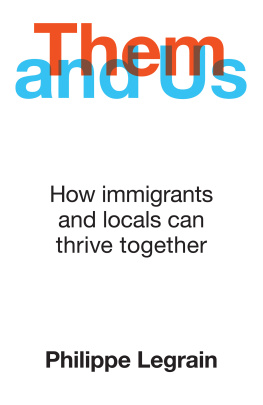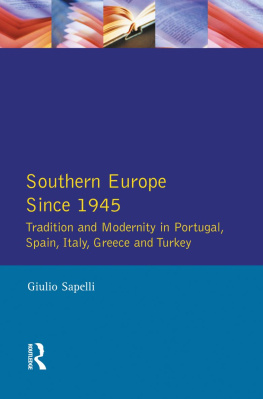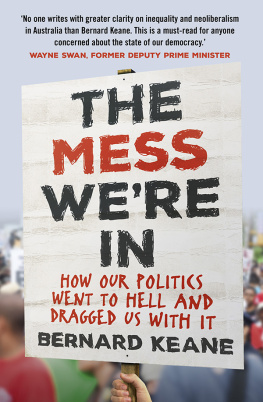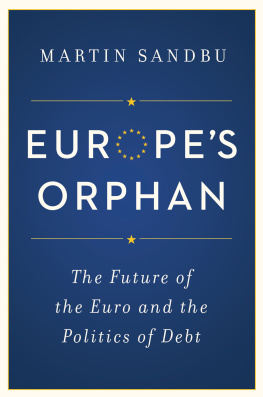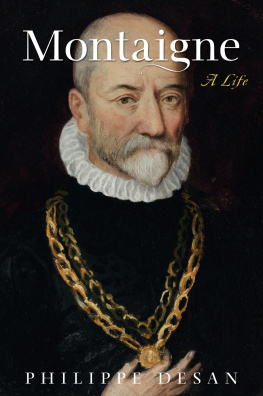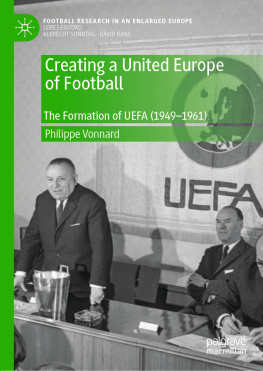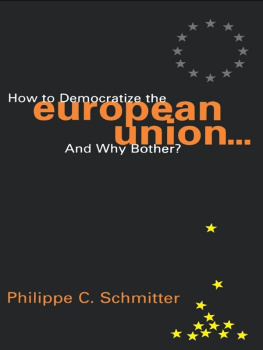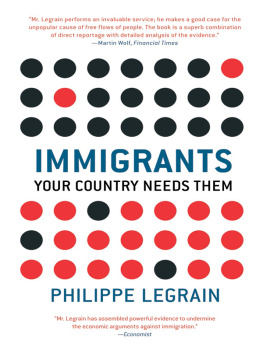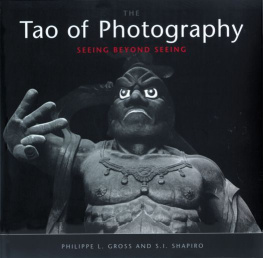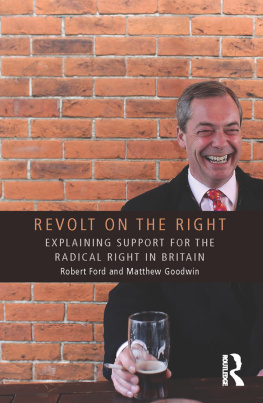European Spring
Why Our Economies
and Politics are in a
Mess and How to Put
Them Right
Philippe Legrain
Copyright 2014, Philippe Legrain
To Pete and Marion, for their resolve in getting the better of his leukaemia, and to my many other wonderful friends, for all their love and support over the years
Philippe Legrain is an independent thinker and communicator who also has practical experience of policymaking at the highest level. He is the author of three critically acclaimed books Open World: The Truth about Globalisation (2002); Immigrants: Your Country Needs Them (2007), which was shortlisted for the Financial Times Business Book of the Year; and Aftershock: Reshaping the World Economy After the Crisis (2010). After seeing him debate on television and reading Aftershock, the president of the European Commission, Jos Manuel Barroso, asked Philippe to advise him. From February 2011 to February 2014, he was independent economic adviser to President Barroso and head of the team that provides the president with strategic policy advice.
Philippes earlier career spanned academia (at LSEs European Institute), journalism (at The Economist; as contributing editor to Prospect; as editor of World Link, the magazine of the World Economic Forum; and independently), policy advice (as special adviser to the director-general of the World Trade Organisation), political campaigning (at Britain in Europe, the pro-European campaign) and independent commentating, consultancy and advocacy. He has a first-class degree in economics and a masters in politics of the world economy, both from the London School of Economics. He has written for a wide variety of international publications, including the Financial Times, the Wall Street Journal, the Guardian and The Times, as well as those affiliated to Project Syndicate, and is a frequent commentator on BBC, Sky and international TV and radio. In 1999, he was highly commended as Young Financial Journalist of the Year in the Wincott awards. He has author pages on Facebook and Google+ and tweets as @plegrain. His personal website is www.philippelegrain.com
Philippe is now setting up OPEN: the Open Political Economy Network, a new kind of think-tank that will function as an international platform for ideas, advocacy and debate on international political economy and openness issues in particular, at www.opennetwork.net
Contents
Acknowledgements
Writing a book is an intensely individual effort, yet it also requires the stimulus and support of a great many people. My agent Jonny Geller and his assistant Kirsten Forster have been very helpful. A big thank you to everyone else at Curtis Brown who has assisted in some way. It has been good working with the dynamic team at Amazons createspace who publish books much faster and more flexibly than traditional publishers tend to. I am extremely grateful to George Soros, whose analysis of the political economy of the eurozone crisis has been masterful, for very kindly providing an endorsement for European Spring. Thank you to Heather Grabbe and Kim Forepaugh for their help with that and much else.
Over the course of my career, some people have been particularly good to me. I owe Nick Barr, my tutor at the London School of Economics, a huge debt of gratitude. Edward Lucas gave me my first break in journalism, aged seventeen, followed closely by Anthony Robinson at the Financial Times. Bill Emmott hired me at The Economist back in 1997 and has continued to be very supportive. Simon Long kindly provided comments on the manuscripts of my three previous books; I spared him the ordeal this time: he is suffering enough from Spurs misfortunes. Mike Moore and his wife Yvonne have been true friends ever since I worked for Mike at the WTO; I admire him immensely. Annie Maccoby and Erik Berglf are wonderful friends, wise counsels and an inspiration.
Over the past three years working for President Barroso, I have met many interesting people whom I cannot all name here. Id like to thank President Barroso for the opportunity to make a difference in tackling the crisis in the eurozone. His assistant Rita Castro Dias has always been very kind. Id also like to thank Jean-Claude Thbault, the director-general of the Bureau of European Policy Advisers, for his support. I have made many friends among my colleagues in BEPA, not least Graeme Carter, Paola Colombo, Paola Rossi and Anne Glover. Antonio Missiroli, Joao Marques de Almeida and Matti Maasikas have since gone on to greater things. A special thanks to everyone in BEPAs Analysis Team, whom I led for three years, and to my wonderful assistants Carmen Tresguerres and Lynn Scave in particular. Baudouin Regout, Eric Peters and the rest of the team have been great.
Elsewhere in the European Commission, Id like to thank Vice-President Neelie Kroes and her team for asking me to contribute to efforts to abolish roaming and create a single market for mobile networks. Ryan Heath has become a good friend. Thank you too to Ed Bannerman and Chantal Hughes for their friendship. Cecilia Malmstrm and her team fight the good fight on immigration; Kristina Lindahl now does so in Sweden. I have also worked well with Marc Vanheukelen and Jonathan Faull. At the European Council, I have always been stimulated by Shahin Valle, who has a fine mind and a good heart. Peter Praet is a force for good at the European Central Bank. I also built good relations with many other policymakers and diplomats; you know who you are.
After Dominique Strauss-Kahn resigned and Christine Lagarde replaced him, the International Monetary Fund became more of a voice of reason in the eurozone crisis. Thank you to David Lipton, Min Zhu, Nemat Shafik, Olivier Blanchard, Jos Vials, Mahmood Pradhan, Stijn Claessens and many others for our stimulating exchanges. I also worked closely with the World Banks Europe and Central Asia team, notably Philippe Le Hourou, Indermit Gill and Dirk Reinermann, together with Kaushik Basu and his predecessor as chief economist, Justin Lin. Dilip Ratha, the Banks migration guru, has been particularly supportive.
I have learnt a lot from my friends and acquaintances in the think-tank world. Fredrik Erixon of the European Centre for International Political Economy (ECIPE) is an old friend; his co-director Hosuk Lee Makiyama a newer one. Razeen Sally was very helpful with Aftershock. Ann Mettler and Paul Hofheinz, the dynamic duo who drive the Lisbon Council, where I used to be a senior fellow, have always been a source of support and advice. Charles Grant, Simon Tilford and everyone at the Centre for European Reform are great; all the best to Hugo Brady in his new job. Many thanks to Mattias Goldmann, Andreas Bergstrm and everyone at FORES in Stockholm, who have invited me to speak many times and published an updated Swedish edition of Immigrants: Your Country Needs Them. Thank you too to Roger Liddle, Olaf Cramme, Michael McTernan, Renaud Thillaye and everyone at Policy Network, who have also involved me in many interesting events.
Good ideas are sparked by stimulating conversations with a wide variety of people. Id also like to thank Rob Johnson and Eric Beinhocker at the Institute for New Economic Thinking (INET); Adam Posen, Fred Bergsten, Arvind Subramanian, Nicolas Vron, Jakob Funk Kirkegaard, John Williamson and others at the Peterson Institute; Pascal Lamy; Danny Sriskandarajah at Civicus; Clive Crook; Jean-Pierre Lehmann at the Fung Global Institute; Sebastian Mallaby and Robert Kahn at the Council on Foreign Relations; Rob Shapiro at Sonecon; Richard Reeves at Brookings; Susan Lund at the McKinsey Global Institute; Michael Leigh and Ian Lesser at the German Marshall Fund of the US; Jan Techau and Sinan Ulgen at Carnegie Europe; Tyson Barker (now at the State Department) and Andy Cohen at the Bertelsmann Foundation North America; Stijn Hoorens and Svitlana Kobzar at RAND Europe; Vivien Pertusot at Ifri; Mark Leonard and everyone at the European Council on Foreign Relations; Jean Pisani-Ferry (formerly at Bruegel); Nick Pearce, Eileen McGowan and Will Straw at IPPR; Loukas Tsoukalis at ELIAMEP; Michael Clemens and Owen Barder at the Centre for Global Development; Geoff Mulgan and Stian Westlake at NESTA; Jonathan Portes at NIESR; Shannon Pfohman and Michael Privot at ENAR; Carl Dolan at Transparency International; Catherine Fieschi at Counterpoint; Michiel van Hulten of Vote Watch Europe; Rainer Mnz at Erste Group; Claire Fox at the Institute for Ideas; and Austin Williams of Bookshop Barnies.
Next page

